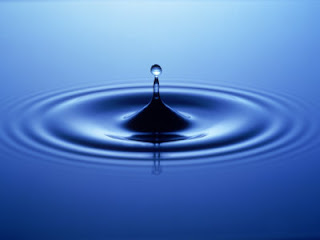Lifetime of Liquid Water
 Apologies for the hiatus recently, it's been a busy time (when isn't
it). I hope to get back to talking about experiments soon, but for now I
wanted to write up a quick problem I thought up a while back. The
question is this: how long does a molecule of H2O on earth remain in the
liquid state, on average? I'm going to treat this purely as an order of
magnitude problem. I'm also going to have to start with one assumption
that is almost certainly inaccurate, but makes things a lot easier. I'm
going to assume perfect mixing of all of the water on earth. Given that
assumption, I really only need to figure out two things. The first is
how much liquid water there is on earth. The second is now much liquid
water leaves the liquid phase each year. Let's start with the total
amount of liquid water on earth. This is relatively easy to estimate. I
happen to know that about 70% of the earth's surface is covered in
water. Most all of that is ocean. To an order of magnitude, the average
depth of the ocean must be 1 km, as it is certainly not 100 m or 10 km
[1]. For a thin spherically shell, the volume of the shell is roughly $$
4 \pi r_e^2 \Delta r $$ where r_e is the radius of the earth. Thus,
the total volume of water on the earth is $$.74 \pi r_e^2 (1 km)$$
Now, we need to figure out how much H20 leaves the liquid phase every
year. To an order of magnitude, it rains 1 m everywhere on earth each
year, it's not .1 m or 10 m [2]. I'm going to ignore any
freezing/melting in the ice caps, assuming that is small fraction of the
water that leaves the liquid phase each year. Since we have a closed
system, all the water that rains must have left the liquid phase. So, on
average, the total volume of water that leaves the liquid phase is $$4
\pi r_e^2 (1 m) $$ Thus, the fraction of liquid water that changes
phase per year is $$ \frac{4 \pi r_e^2 (1m)}{.74\pi r_e^2 (1
km)} = .0014 $$ This means that, given my assumption of perfect mixing,
in somewhere around 1/.0014 = 700 yr all of the water on earth will have
cycled through the vapor phase. Since we're only operating to an order
of magnitude, I'll call this 1000 years. This is the answer to our
question if every molecule has been in the vapor phase once in 1000
years, then we expect a molecule to stay in the liquid phase for 1000
years [1] According to wikipedia, this is really about 4 km, so we're
underestimating a bit. [2] According to wikipedia, this is spot on (.99
m on average).
Apologies for the hiatus recently, it's been a busy time (when isn't
it). I hope to get back to talking about experiments soon, but for now I
wanted to write up a quick problem I thought up a while back. The
question is this: how long does a molecule of H2O on earth remain in the
liquid state, on average? I'm going to treat this purely as an order of
magnitude problem. I'm also going to have to start with one assumption
that is almost certainly inaccurate, but makes things a lot easier. I'm
going to assume perfect mixing of all of the water on earth. Given that
assumption, I really only need to figure out two things. The first is
how much liquid water there is on earth. The second is now much liquid
water leaves the liquid phase each year. Let's start with the total
amount of liquid water on earth. This is relatively easy to estimate. I
happen to know that about 70% of the earth's surface is covered in
water. Most all of that is ocean. To an order of magnitude, the average
depth of the ocean must be 1 km, as it is certainly not 100 m or 10 km
[1]. For a thin spherically shell, the volume of the shell is roughly $$
4 \pi r_e^2 \Delta r $$ where r_e is the radius of the earth. Thus,
the total volume of water on the earth is $$.74 \pi r_e^2 (1 km)$$
Now, we need to figure out how much H20 leaves the liquid phase every
year. To an order of magnitude, it rains 1 m everywhere on earth each
year, it's not .1 m or 10 m [2]. I'm going to ignore any
freezing/melting in the ice caps, assuming that is small fraction of the
water that leaves the liquid phase each year. Since we have a closed
system, all the water that rains must have left the liquid phase. So, on
average, the total volume of water that leaves the liquid phase is $$4
\pi r_e^2 (1 m) $$ Thus, the fraction of liquid water that changes
phase per year is $$ \frac{4 \pi r_e^2 (1m)}{.74\pi r_e^2 (1
km)} = .0014 $$ This means that, given my assumption of perfect mixing,
in somewhere around 1/.0014 = 700 yr all of the water on earth will have
cycled through the vapor phase. Since we're only operating to an order
of magnitude, I'll call this 1000 years. This is the answer to our
question if every molecule has been in the vapor phase once in 1000
years, then we expect a molecule to stay in the liquid phase for 1000
years [1] According to wikipedia, this is really about 4 km, so we're
underestimating a bit. [2] According to wikipedia, this is spot on (.99
m on average).
Comments
Comments powered by Disqus